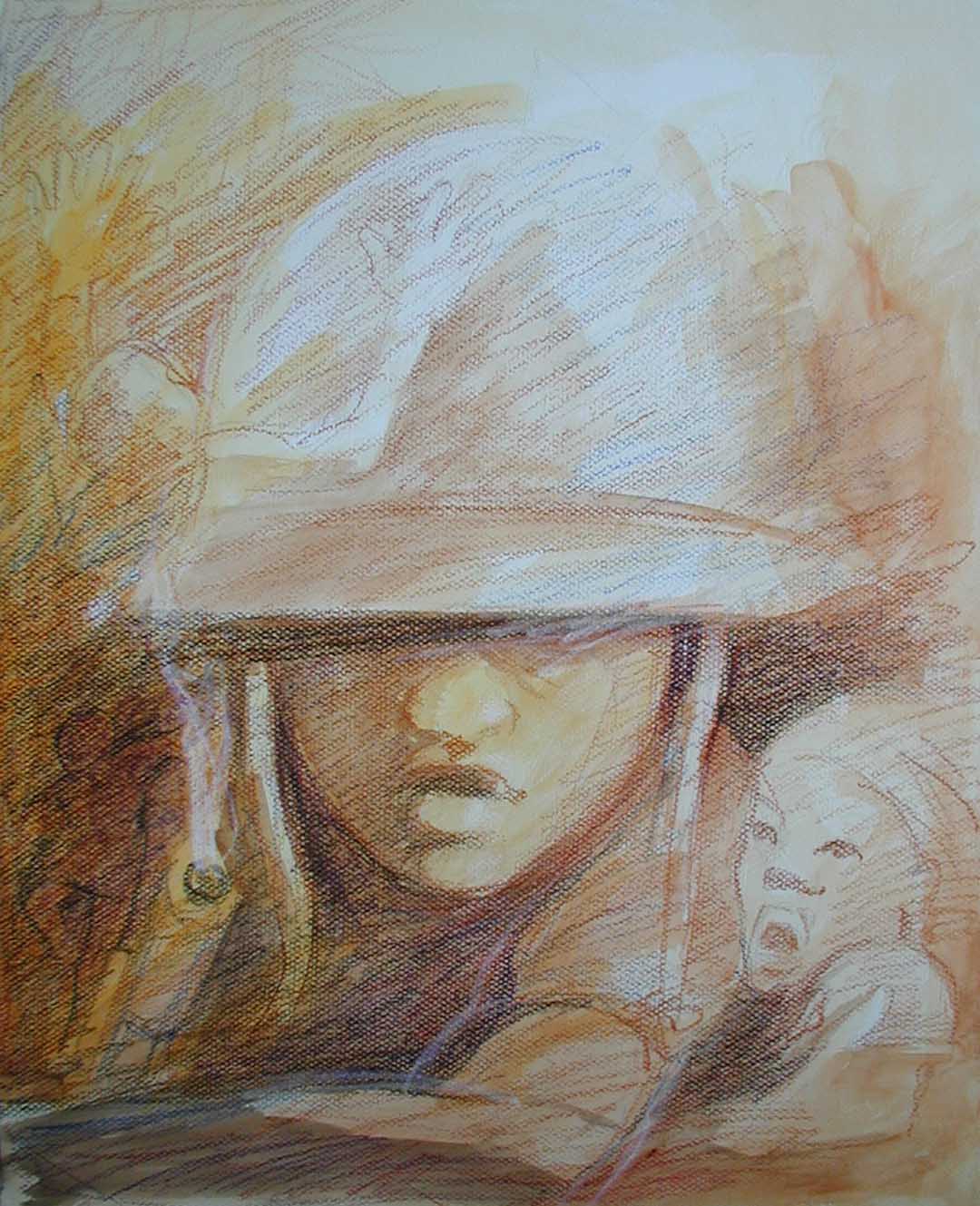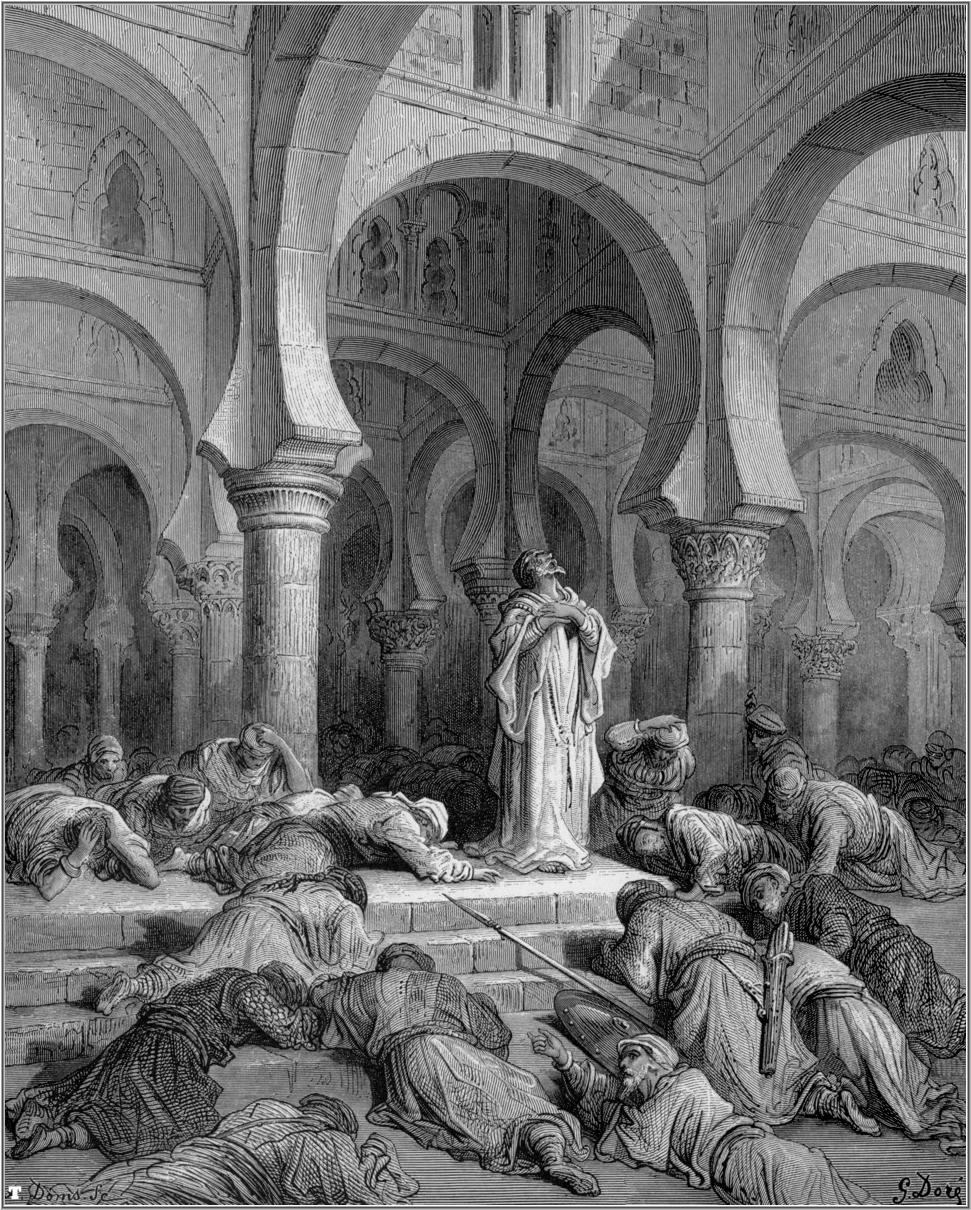|
Milton Blahyi
Joshua Milton Blahyi (born September 30, 1971), better known by his nom de guerre General Butt Naked, is a Liberian evangelical preacher, writer and former warlord best known for his actions during the First Liberian Civil War. During the conflict, Blahyi led a group of soldiers which fought on the side of rebel group United Liberation Movement of Liberia for Democracy (ULIMO) before converting to Christianity and becoming a pastor in 1996. Born in the Liberian capital of Monrovia to a Krahn family, Blahyi was handed by his father to several tribal elders who initiated him as a high priest in 1982 at the age of eleven. After Armed Forces of Liberia (AFL) officer Samuel K. Doe staged a coup d'état against President William R. Tolbert in 1980, the new regime employed Blahyi to perform black magic rituals at the presidential palace in Monrovia to help him win the 1985 general election. In 1989, National Patriotic Front of Liberia (NPFL) rebel leader Charles Taylor launched a ... [...More Info...] [...Related Items...] OR: [Wikipedia] [Google] [Baidu] |
Monrovia
Monrovia () is the capital city of the West African country of Liberia. Founded in 1822, it is located on Cape Mesurado on the Atlantic coast and as of the 2008 census had 1,010,970 residents, home to 29% of Liberia’s total population. As the nation's primate city, Monrovia is the country's economic, financial and cultural center; its economy is primarily centered on its harbor and its role as the seat of Liberian government. Etymology Monrovia is named in honor of U.S. President James Monroe, a prominent supporter of the colonization of Liberia and the American Colonization Society. Along with Washington, D.C., it is one of two world capitals to be named after a U.S. President. History Before 1816, the area around Cape Mesurado and the mouth of the Mesurado River was called Ducor. It had long been established as a crossroads and place of trade, and was inhabited by fishing, trading and farming communities of various ethnicities, including the Dey, Kru, Bassa, Gola, and ... [...More Info...] [...Related Items...] OR: [Wikipedia] [Google] [Baidu] |
Child Sacrifice
Child sacrifice is the ritualistic killing of children in order to please or appease a deity, supernatural beings, or sacred social order, tribal, group or national loyalties in order to achieve a desired result. As such, it is a form of human sacrifice. Child sacrifice is thought to be an extreme extension of the idea that the more important the object of sacrifice, the more devout the person giving it up is. The practice of child sacrifice in Europe and the Near East appears to have ended as a part of the religious transformations of late antiquity. Pre-Columbian cultures Archaeologists have found the remains of more than 140 children who were sacrificed in Peru's northern coastal region. Aztec culture Archeologists have found remains of 42 children. It is alleged that these remains were sacrificed to Tlaloc (and a few to Ehécatl, Quetzalcoatl and Huitzilopochtli) in the offerings of the Great Pyramid of Tenochtitlan by the Aztecs of pre-Columbian Mexico. In every ca ... [...More Info...] [...Related Items...] OR: [Wikipedia] [Google] [Baidu] |
Children In The Military
Children (defined by the Convention on the Rights of the Child as people under the age of 18) have been recruited for participation in military operations and campaigns throughout history and in many cultures. Children in the military, including state armed forces, non-state armed groups, and other military organizations, may be trained for combat, assigned to support roles such as porters or messengers, or used for tactical advantage as human shields or for political advantage in propaganda. Children are targeted for their susceptibility to influence, which renders them easier to recruit and control. While some are recruited by force, others choose to join up, often to escape poverty or because they expect military life to offer a rite of passage to maturity. Child soldiers who survive armed conflict frequently develop psychiatric illness, poor literacy and numeracy, and behavioral problems such as heightened aggression, which together lead to an increased risk of unemploym ... [...More Info...] [...Related Items...] OR: [Wikipedia] [Google] [Baidu] |
Mandinka People
The Mandinka or Malinke are a West African ethnic group primarily found in southern Mali, the Gambia and eastern Guinea. Numbering about 11 million, they are the largest subgroup of the Mandé peoples and one of the largest ethnic-linguistic groups in Africa. They speak the Manding languages in the Mande language family and a ''lingua franca'' in much of West Africa. Over 99% of Mandinka adhere to Islam. They are predominantly subsistence farmers and live in rural villages. Their largest urban center is Bamako, the capital of Mali. The Mandinka are the descendants of the Mali Empire, which rose to power in the 13th century under the rule of king Sundiata Keita, who founded an empire that would go on to span a large part of West Africa. They migrated west from the Niger River in search of better agricultural lands and more opportunities for conquest. Nowadays, the Mandinka inhabit the West Sudanian savanna region extending from The Gambia and the Casamance region in Senegal to Iv ... [...More Info...] [...Related Items...] OR: [Wikipedia] [Google] [Baidu] |
Invocation
An invocation (from the Latin verb ''invocare'' "to call on, invoke, to give") may take the form of: *Supplication, prayer or spell. *A form of possession. *Command or conjuration. *Self-identification with certain spirits. These forms are described below, but are not mutually exclusive. See also Theurgy. Supplication or prayer As a supplication or prayer, an invocation implies calling upon God, a god, goddess, or person. When a person calls upon God, a god, or goddess to ask for something (protection, a favour, or his/her spiritual presence in a ceremony) or simply for worship, this can be done in a pre-established form or with the invoker's own words or actions. An example of a pre-established text for an invocation is the Lord's Prayer. All religions in general use invoking prayers, liturgies, or hymns; see for example the mantras in Hinduism and Buddhism, the Egyptian ''Coming Out by Day'' (aka ''Book of the Dead''), the Orphic Hymns and the many texts, still prese ... [...More Info...] [...Related Items...] OR: [Wikipedia] [Google] [Baidu] |
Altar
An altar is a table or platform for the presentation of religious offerings, for sacrifices, or for other ritualistic purposes. Altars are found at shrines, temples, churches, and other places of worship. They are used particularly in paganism, Christianity, Buddhism, Hinduism, Judaism, modern paganism, and in certain Islamic communities around Caucasia and Asia Minor. Many historical-medieval faiths also made use of them, including the Roman, Greek, and Norse religions. Etymology The modern English word '' altar'' was derived from Middle English '' altar'', from Old English '' alter'', taken from Latin '' altare'' ("altar"), probably related to '' adolere'' ("burn"); thus "burning place", influenced by '' altus'' ("high"). It displaced the native Old English word '' wēofod''. Altars in antiquity File:Tel Be'er Sheva Altar 2007041.JPG, Horned altar at Tel Be'er Sheva, Israel. File:3217 - Athens - Sto… of Attalus Museum - Kylix - Photo by Giovanni Dall'Orto, ... [...More Info...] [...Related Items...] OR: [Wikipedia] [Google] [Baidu] |
Elder (administrative Title)
The term Elder, or its equivalent in another language, is used in several countries and organizations to indicate a position of authority. This usage is usually derived from the notion that the oldest members of any given group are the wisest, and are thus the most qualified to rule, provide counsel or serve the said group in some other capacity. Elder systems Elder is a role played in the organised community that is most common in tribal subsistence cultures, ''Elderhood'' being the condition or quality of being an elder. It is essentially the state of being in the latter portion of one's life and being looked to for leadership of either a passive or active nature by your peers and\or subordinates due almost exclusively to this fact. Sometimes it involves a ceremonial investiture of some kind, and other times it does not. Sometimes it involves a definite chronological milestone which must be surpassed, while at other times the required age is simply relative to the ages of all of ... [...More Info...] [...Related Items...] OR: [Wikipedia] [Google] [Baidu] |
Vision (spirituality)
A vision is something seen in a dream, trance, or religious ecstasy, especially a supernatural appearance that usually conveys a revelation. Visions generally have more clarity than dreams, but traditionally fewer psychological connotations. Visions are known to emerge from spiritual traditions and could provide a lens into human nature and reality. Prophecy is often associated with visions. Categories Evelyn Underhill distinguishes and categorizes three types of visions: # Intellectual Visions – The Catholic dictionary defines these as supernatural knowledge in which the mind receives an extraordinary grasp of some revealed truth without the aid of sensible impressions and mystics describe them as intuitions that leave a deep impression. # Imaginary – In Teresa of Avila's ''The Interior Castle'', an imaginary vision is defined as one where nothing is seen or heard by the senses of seeing or hearing, but where the same impression is received that would be produced upon ... [...More Info...] [...Related Items...] OR: [Wikipedia] [Google] [Baidu] |
Human Sacrifice
Human sacrifice is the act of killing one or more humans as part of a ritual, which is usually intended to please or appease gods, a human ruler, an authoritative/priestly figure or spirits of dead ancestors or as a retainer sacrifice, wherein a monarch's servants are killed in order for them to continue to serve their master in the next life. Closely related practices found in some tribal societies are cannibalism and headhunting. Human sacrifice was practiced in many human societies beginning in prehistoric times. By the Iron Age with the associated developments in religion (the Axial Age), human sacrifice was becoming less common throughout Africa, Europe, and Asia, and came to be looked down upon as barbaric during classical antiquity. In the Americas, however, human sacrifice continued to be practiced, by some, to varying degrees until the European colonization of the Americas. Today, human sacrifice has become extremely rare. Modern secular laws treat human sacrifices ... [...More Info...] [...Related Items...] OR: [Wikipedia] [Google] [Baidu] |
Warrior
A warrior is a person specializing in combat or warfare, especially within the context of a tribal or clan-based warrior culture society that recognizes a separate warrior aristocracies, class, or caste. History Warriors seem to have been present in the earliest pre-state societies. Scholars have argued that horse-riding Yamnaya warriors from the Pontic–Caspian steppe played a key role during the Indo-European migrations and the diffusion of Indo-European languages across Eurasia. Most of the basic weapons used by warriors appeared before the rise of most hierarchical systems. Bows and arrows, clubs, spears, swords, and other edged weapons were in widespread use. However, with the new findings of metallurgy, the aforementioned weapons had grown in effectiveness. When the first hierarchical systems evolved 5000 years ago, the gap between the rulers and the ruled had increased. Making war to extend the outreach of their territories, rulers often forced men from lower orders ... [...More Info...] [...Related Items...] OR: [Wikipedia] [Google] [Baidu] |
Sinoe County
Sinoe is one of Liberia's 15 counties and it has 17 districts. Greenville is the county's capital. As of the 2008 Census, it had a population of 104,932, making it one of the least populous counties in Liberia. Sinoe has the third-largest area of all Liberia's counties; it has the second least-dense population after Gbarpolu County. The County was originally a colony in the name Mississippi-in-Africa, under auspices of a chapter of the American Colonization Society as it was created with slaves from Mississippi to Liberia. There are seventeen districts in the county and it has lower tropical forests which has mid size hills composed of various valleys and water courses. Sapo National Park (, a National protected area, Sankwehn Proposed Reserve, occupying an area of , a National proposed reserve and LTPC Reforestation Project with an area of are the major plantation areas in the county. The flag is a green cross on a white background with the flag of Liberia in the top-left co ... [...More Info...] [...Related Items...] OR: [Wikipedia] [Google] [Baidu] |
Samuel K
Samuel ''Šəmūʾēl'', Tiberian: ''Šămūʾēl''; ar, شموئيل or صموئيل '; el, Σαμουήλ ''Samouḗl''; la, Samūēl is a figure who, in the narratives of the Hebrew Bible, plays a key role in the transition from the biblical judges to the United Kingdom of Israel under Saul, and again in the monarchy's transition from Saul to David. He is venerated as a prophet in Judaism, Christianity, and Islam. In addition to his role in the Hebrew scriptures, Samuel is mentioned in Jewish rabbinical literature, in the Christian New Testament, and in the second chapter of the Quran (although Islamic texts do not mention him by name). He is also treated in the fifth through seventh books of ''Antiquities of the Jews'', written by the Jewish scholar Josephus in the first century. He is first called "the Seer" in 1 Samuel 9:9. Biblical account Family Samuel's mother was Hannah and his father was Elkanah. Elkanah lived at Ramathaim in the district of Zuph. His gene ... [...More Info...] [...Related Items...] OR: [Wikipedia] [Google] [Baidu] |








_-_Ciudad_de_México.jpg)

